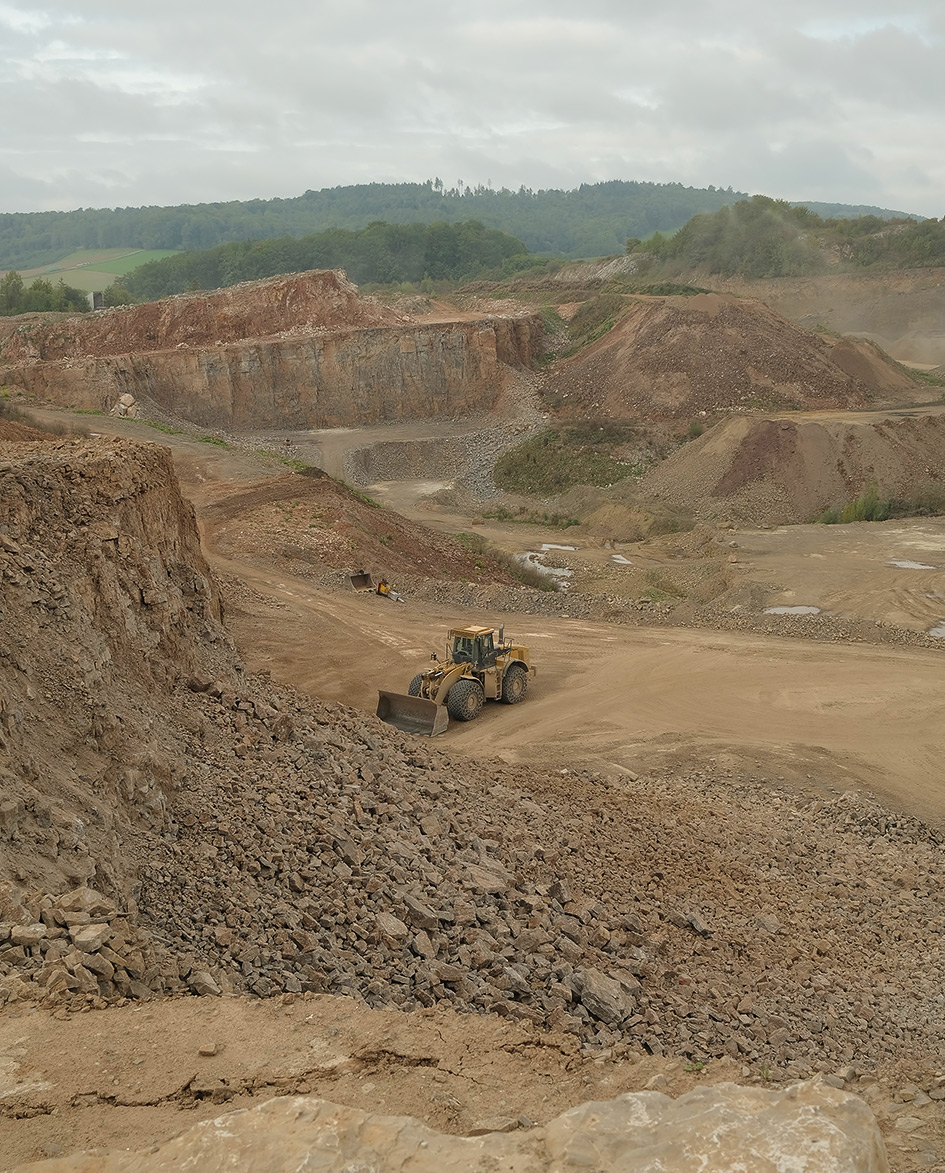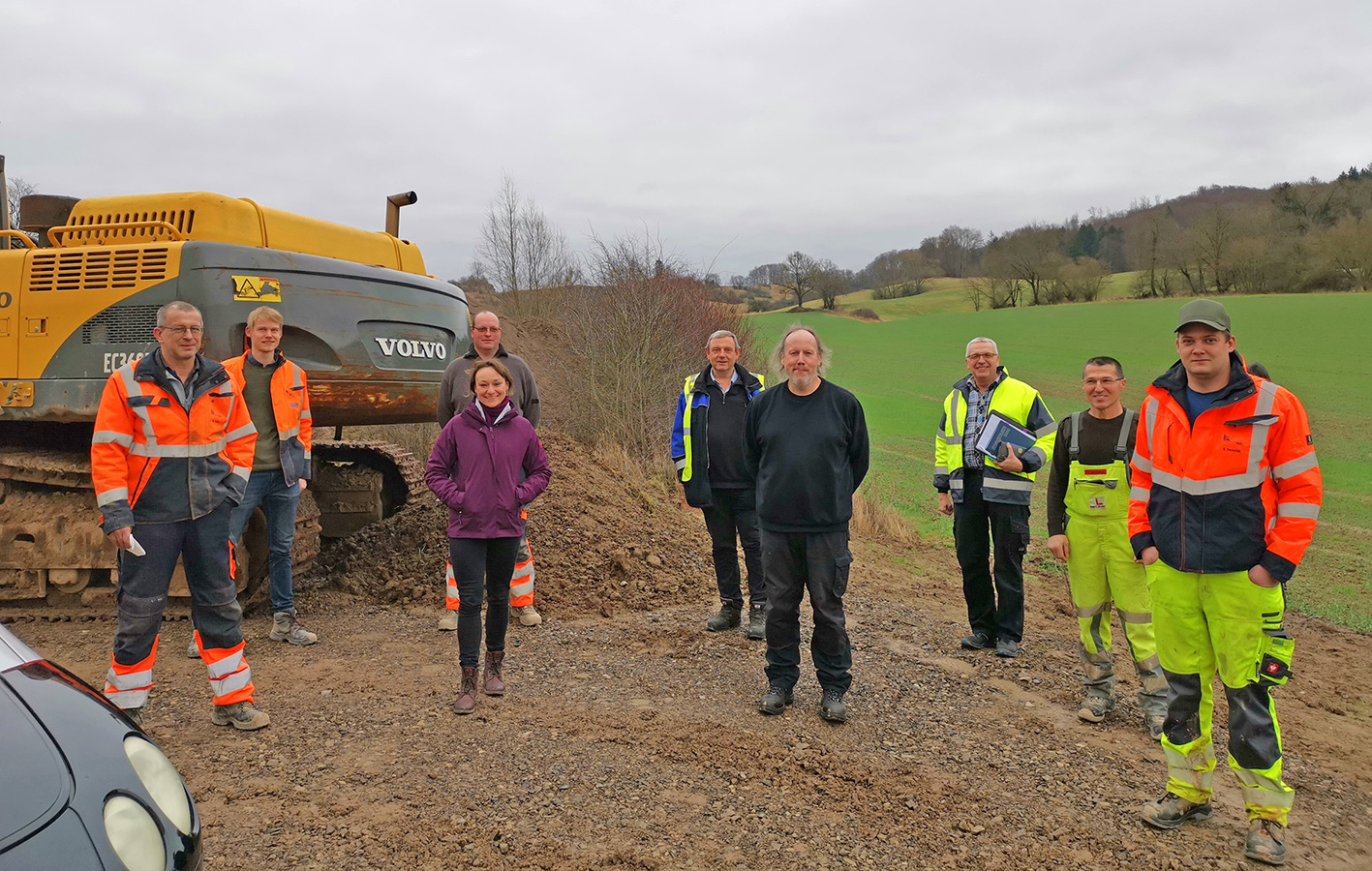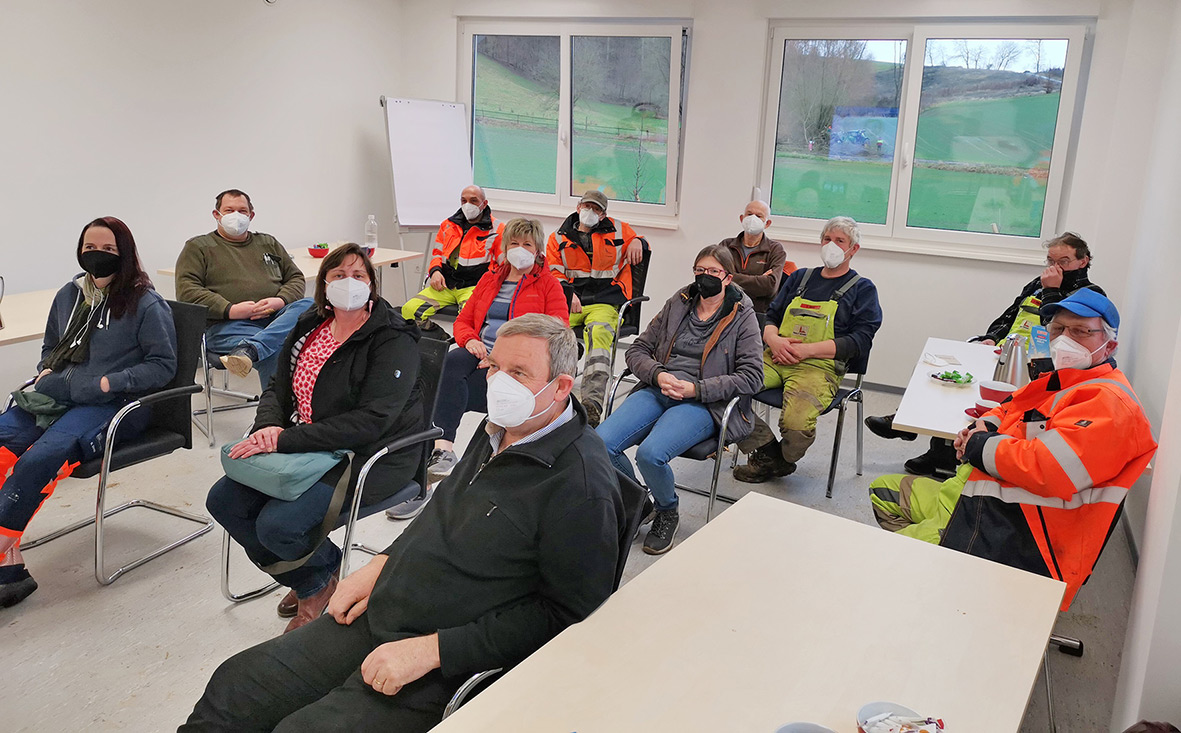Introduction

Fig. 1. Rump & Salzmann’s Uehrde gypsum quarry. Bild 1. Gipssteinbruch Uehrde von Rump & Salzmann. Photo/Foto: Rump & Salzmann
The world is becoming more and more complex, and accordingly companies – whether small or large – are also challenged to change in their structure and management. An important basis for this is the sensible and lively implementation of the risk assessment of mental stress.
The Rump & Salzmann Gipswerk Uehrde GmbH & Co. KG (Figure 1), Osterode am Harz/Germany, carried out this assessment for the first time in 2017. Due to Corona, the renewed implementation was delayed and took place in 2022. The small company with its 22 employees has been a committed participant in the Alternative Care for many years (according to DGU V2, Annex 3, in the version of 1st January 2014).
As in the first case, the gypsum plant relied on the tried and tested procedure for the risk assessment of mental stress (Figures 2, 3), which was developed by a consulting company in cooperation with the Employer’s Liability Insurance Association for Electrical, Textile, Energy and Media Products (BG ETEM), Cologne/Germany, and the Technical University of Dresden.

Fig. 2. Kick-off for the repeat survey with the steering committee of Rump & Salzmann, accompanied by the company physician of BG RCI, Bernhard Kirchner, and the external moderator Kristin Kramer. // Bild 2. Kick-Off zur Wiederholungsbefragung mit dem Steuerkreis von Rump & Salzmann begleitet durch den Betriebsarzt der BG RCI, Bernhard Kirchner, und die externe Moderatorin Kristin Kramer. Photo/Foto: Rump & Salzmann
The survey with workshop evaluation of the employees focused on the following questions: What has changed in the small company since 2017? How have the stresses in the company and among the employees changed? What has improved and what (new) stresses have been added?

Fig. 3. All employees were informed about the repeat measurement. Afterwards, they could voluntarily fill out the questionnaire on the risk assessment of mental stress. // Bild 3. Alle Mitarbeiterinnen und Mitarbeiter wurden zur Wiederholungsmessung informiert. Im Anschluss konnten sie den Fragebogen zur Gefährdungsbeurteilung psychischer Belastungen freiwillig ausfüllen. Photo/Foto: Rump & Salzmann
Uwe Schridde, Plant Manager
Kristin Kramer/Bernhard Kirchner: Mr. Schridde, in 2017 you carried out the risk assessment of mental stress in your company for the first time. What measures were initiated as a result?
Uwe Schridde: The biggest measure was that we built a new hall in the quarry. In principle, the risk assessment helped us to pursue the considerable need for renovation with vigour. At the same time, the process in which our quarry foremen received leadership feedback has underlined the importance of leadership seminars and the continuous development of leadership skills. The masters have developed personally. They have used the feedback to work on their leadership skills. They take more time for their employees, listen to them. This has led to a noticeable improvement in cooperation.
Kramer/Kirchner: What was the starting point for you for the repeat assessment?
Schridde: For me, the key question was how we have developed over the last few years. Because of the Corona pandemic it is now five years that we look back. The repeat measurement has shown that we have developed further, but of course there is still room for improvement. You are never at the end, there are always new approaches. The improvement of working conditions is a permanent topic, as structures change, new staff members join and we have to adapt to ever new work requirements through, e. g., new systems.
Kramer/Kirchner: What lessons have you learned from the 2022 repeat assessment? Where do you see the focus this time?
Schridde: For me, the issue is to strengthen the personal responsibility of my employees so that they have more confidence in themselves to initiate changes and implement ideas. I am thinking, for example, of the fact that a Bruchmeister initiated and changed a lot with the 6-S project.
Kramer/Kirchner: Is a third repeat assessment planned? What is particularly important to you in this?
Schridde: Yes, in five to six years. For me, open communication in the groups is central. The staff survey provides us with the guidelines for the discussions in the workshops. It is important that this is done by professional moderation so that this exchange is structured and measures are derived and documented at the end. We benefit from the fact that an external moderator and our company doctor, who accompanied and initiated the process, provide valuable impulses from outside. We do this not because we have massive problems, employees are running away from us, there are unresolved conflicts or productivity is suffering. For me, the risk assessment is an important prophylaxis to address issues and continuously improve them before problems escalate. At the same time, through this process we have found important contact persons who advise us on topics related to work and health. This provides security because these experts know the company and the employees.
Kramer/Kirchner: For what reason do you think it is important to stay on top of the issues?
Schridde: Mental stress is a permanent topic. There are always new issues, new programmes that challenge us and require us to adapt. How do we deal with this? How do we take the employees with us and ensure that they stay healthy and motivated? The risk assessment of mental stress offers the best opportunity to answer these questions.
Kramer/Kirchner: What advice would you give to other companies?
Schridde: I can only recommend this process to everyone. It brings the issues to the table, starts a dialogue in which you look for solutions together. In the end, the measures derived increase efficiency.
Markus Teuber, Breaking Foreman
Kramer/Kirchner: Mr. Teuber, you already experienced the risk assessment as a manager in 2017. What were the important changes that were initiated for you?
Markus Teuber: The most important change was that we restructured the division of labour. The colleagues wanted to be able to switch more between the different work activities. In addition, we got a new employee to watch our backs and take care of, e. g., cleaning the facilities.
Kramer/Kirchner: From your point of view, what were the central topics of this year’s risk assessment?
Teuber: Of course, first and foremost it is the topic of communication. Here we have introduced the “master round” and the “shop floor meeting”. Through these meetings, the exchange becomes constructive and communication among each other has improved. We started 6-S and are still implementing this standard. For me personally, it was the feedback I received from my staff that made me happy.
Kramer/Kirchner: What are the benefits of risk assessment?
Teuber: You see the issues that are important. It opens your eyes.
Detlef Bierwisch, Second Breaking Master
Kramer/Kirchner: Mr. Bierwisch, you experienced the risk assessment in 2017 as a staff member and in 2022 in the role of deputy break foreman. What were the most essential measures for you that were implemented after 2017?
Detlef Bierwisch: A lot happened after the 2017 project. The new hall construction was pushed ahead. A lot has changed as a result, the mood among colleagues has improved. The atmosphere has also changed – people talk to each other more.
Kramer/Kirchner: In your opinion, what were the central topics of this year’s risk assessment?
Bierwisch: We are on the right track. The most important topic remains communication. We have to keep at it and especially take the new colleagues with us. We have introduced the “shop floor round” and “master round”. Now it’s a matter of sticking to it. Sometimes five minutes is enough for a short vote so that everyone is on the same level and has the most important information.
Kramer/Kirchner: What do you think are the benefits of the psyche risk assessment?
Bierwisch: All the topics relevant to work are discussed and you think about them yourself: What can I do better? What can I change myself? I think that’s good and this approach is exactly right.
Frank Dernedde, employee at the quarry
Kramer/Kirchner: What were the main measures implemented after the GBU Psyche 2017?
Frank Dernedde: That we talked about all the problems and exchanged opinions on the various topics. In addition, we got reasonable common rooms and meeting rooms where we can now sit together and exchange ideas. I myself have now got a workshop to maintain all the machines. Before, I used to do the repairs in the quarry under a kind of carport in all weathers.
Kramer/Kirchner: From your point of view, what were the central topics of this year’s risk assessment?
Dernedde: Communication is still the central focus.
Kramer/Kirchner: What do you think are the benefits of the psyche risk assessment?
Dernedde: That things are stimulated and people think about it. Otherwise it’s always the same and nothing changes. The project has shown that we have many ideas on how to deal with different issues. Good measures could then be derived from them. The important thing is to keep talking and to follow up on the projects. That is a big challenge in everyday life. That’s why we have a sustainability meeting in November to review the implementation status.
Conclusion
In addition to important practical implementations such as the new hall construction and structural changes such as the new division of labour, the continuously improving leadership style is an important result of the risk assessment of mental stress at the Uehrde gypsum plant. “Health-promoting leadership with an appreciative exchange of experiences” is a leadership style that presupposes the willingness of managers to approach employees in a participatory and cooperative manner. This style of leadership is practised here. Employees need sincere recognition in order to remain healthy and able to work. Every employee is unique with their own skills and talents. Managers sharpen their senses to see what the unique contribution of an employee is to the company, especially by further realising communication at eye level.